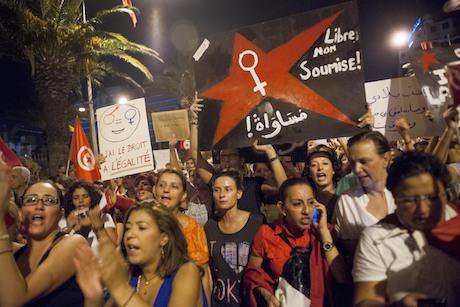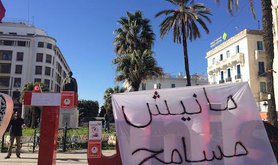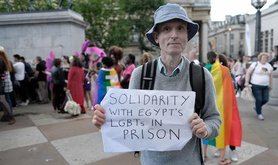
Tunisian women shout slogans and hold posters reading, "don't touch my rights" and "woman is the future of man" during a protest calling for the respect of women's rights and other fundamental rights in Tunis, Tunisia, August 13, 2012. Fauque Nicolas/ABACA/Press Association Images. All rights reserved.
#NoWomanNoFly was the hashtag that concluded 2017 in Tunisia; a year that witnessed historical women’s rights reforms.
The Tunisian Parliament approved a landmark law on violence against women which, unprecedently, included
progressive provisions on domestic violence and marital rape.
The president ordered the abolishment of a
decades-long ban on Tunisian women marrying non-Muslim men, and called for
equal inheritance laws.
Women’s rights, the state, and political instrumentalization
All of these reforms and legislations, specifically lifting the restrictions on women’s marriage to non-Muslims, consolidated Tunisia’s position as the leading Arab Muslim country on women’s rights and gender equality.
However, Tunisian activists have approached these reforms with scepticism, highlighting not only their problematic timing (coming directly after the passing of a highly unpopular amnesty bill) but also the state's continued tradition of instrumentalizing women’s rights for its own political purposes.
The complexities of the Tunisian political and social landscape
President Essebsi has held positions of power in the Tunisian political landscape for the past six decades. Just like his pre-revolution predecessors, he uses selective feminism and women’s rights to weaken political opponents, manipulate public opinion and mask the government’s complete disregard for the demands of the Tunisian revolution.
The timing of this sudden attentiveness to women’s rights was carefully calculated. By lifting the ban on interfaith marriages, he knew all too well how to draw local and international attention away from the nefarious reconciliation bill.
And by calling for equal inheritance laws a few months before the now-postponed local elections, Essebsi was able to put Ennahda in a difficult position: support him and risk losing a significant number of voters, oppose him and risk alienating another portion of Tunisian society and losing international support.
It is unrealistic to believe that patriarchy in Tunisia would be toppled overnight, especially by a president who has a history of insulting and patronizing women.
Maybe the most well-known example is Essebsi’s response to a journalist’s question concerning the then-vice president of the National Constituent Assembly’s, Mehrziya Laabidi, public criticism of him as prime minister. He retorted: “what can I say, she is just a woman.”
Essebsi’s dismissiveness of such a senior politician caused outrage. This was by no means the only incident.
In 2011, he replied to a journalist’s question by asking her about her age and condescendingly calling her “my child”, causing the other men around him to burst out in laughter.
An equally alarming comment was made in 2011 during an interview on an Egyptian talk show when the state figure referred to women who wear the niqab as “crows.”
The marginalization of women’s rights
With these facts in mind, it should be noted that the international community is also guilty of selective feminism. Western governments have long been aware of and, not only silent but, often complicit in extensive human rights violations committed by their allies in the region, which include discrimination against women. Saudi Arabia is a prime example.
Because of international interest in Saudi Arabia’s vast oil reserves and geostrategic position, flags were lowered in the United Kingdom and flew at half-mast in Australia when King Abdullah passed away in 2015.
Barack Obama referred to US/Saudi relations as “warm and genuine”, and the IMF's Christine Lagarde praised the leader of the only country in the world where women were not allowed to drive cars as a "strong advocate for women."
In a similar fashion, France’s stance towards Tunisia’s dictatorship was shaped by its strong economic ties to its former colony. In that context, it was not surprising when former President Jacques Chirac praised Tunisia as “a pole of stability and peace” then announced an increase in the financial aid in 1995, while conveniently failing to mention the dreadful human rights violations.
The US also kept silent in the face of gross violations, state oppression and persecution of women, backing the Ben Ali regime because of its cooperation in the “war on terror” and the 2003 Anti-Terrorism Law.
Before the revolution, Circular 108 prevented women from the right to wear the hijab in public institutions, which led to decades of state harassment, imprisonment and persecution. International NGOs such as Oxfam turned a blind eye towards the struggles of thousands of hijab-wearing women under the Ben Ali regime, never denouncing the dictator’s anti-hijab policies.
While thousands of women were being deprived of their basic rights, ATFD issued a statement in 2003 expressing their “profound concern about the spread of the head-scarf in the country”, questioning “the state’s responsibility in the spread of this phenomenon” and stating that the government’s “policy concerning women and the place of religion in society is ambitious and marked by the absence of a clear political position concerning the hijab.”
Tunisian women are often exploited by companies, especially in the textile industry under Law 1972, where they are employed with low wages and short-term contracts to appeal to foreign investors. This also did not make headlines.
However, foreign activists and western media were quick to celebrate the legal reform granting Tunisian women the choice to marry non-Muslim men, coining it as empowering. But do all Tunisian women feel empowered?
The truth is, even though the repeal of the 1973 decree is a crucial step, these state-led reforms overlook questions of class and marginalize other important women’s struggles – those of the Tunisian women who are never on the political agenda and who never dream of making it to international news.
In May 2017, a group of unemployed women in Sidi Bouzid, the majority of whom have higher education degrees, started “The Feminine Movement of Menzel Bouzayane” demanding employment opportunities and a chance to preserve their dignity.
The women of the movement held a sit-in front of the municipality for several months, and organized a march from their town to the governorate of Sidi Bouzid (around 80 km) under the slogan “Manich Sekta” (I won’t stay quiet).
When the President proposed repealing decree 73 for the first time in August, eighteen of the protesters were on hunger strike because the government was not responding to their plight. This apparently was not picked up by international media.
The “Manich Sekta” movement is a painful reminder that there are women who suffer from inequality, marginalization and exclusion, yet the ugliness of their reality was completely eclipsed by this internationally-attractive reform in marriage customs.
Talking to several young women who work in a textile factory in the coastal city of Nabeul, I was reminded of the plight of working class women. Their complaints were the same: salaries are much lower than the legal minimum wage, a lack of social insurance and in some cases, sexual harassment in the work place.
These women, and thousands of others, would understandably be indifferent to Essebsi’s reforms. The political elite choose ignore the real struggles.
Addressing issues of farmer land ownership and access by women in rural areas, assuring equal pay, job security, health insurance and dignity in the work place are simply not as appealing as certain religiously-controversial reforms.
Nabeul, like Sousse and Monastir, is one of the lucky coastal cities that has been fairly developed by both the pre-revolution and current regime. However, southern regions have been neglected and women have not been included in the reform process. The government has instead focused on polarizing issues for political gains.
Further reforms and a continuing trend
Recently, the committee for individual liberties and equality have introduced proposals in favour of abolishing the “Mahr” clause (dowry) in marriage contracts, the right to adopt either the mother’s or father’s last name and the option of gender-equal inheritance.
Specific details of this proposal have yet to be revealed. The mahr, an amount of money given by the groom to the bride when signing the marriage contract, is merely symbolic in Tunisia. Of course, the reasoning behind its symbolism is highly problematic, as it confirms the husband’s place as the head of the family and the financial provider and insinuates certain expectations of the wife in exchange for such “payment.”
However, in practice, the act itself does not carry any weight, legal or otherwise, and is often set at one Tunisian Dinar. The practices of state institutions are what carry weight.
Safaa, a high school teacher in Tunis, recently became a mother. While registering her daughter at the National Fund for Health Insurance (CNAM), she was informed that she was not allowed to and the child would have to be registered under her father’s insurance. “It’s like she’s not equally my daughter,” says Safaa.
State institutions have a tendency of establishing pseudo-laws that turn mothers into second-class citizens. According to Safaa, official student school documents always require the father’s signature. If the student shows up with a mother’s signature, they may be asked to provide proof of their father’s absence.
The fight for women’s rights in Tunisia tends to be mistakenly perceived as a battle between a secular state and religious thinkers.
The Committee for Individual Liberties and Equality was launched in 2017, and seems to follow the same trends. When it comes to women’s marginalization, the majority of the reforms disregard the role of the state and only focus on religiosity and conservatism.
The ground-breaking law on violence against women of July 2017 has undeniably revolutionized women’s rights legislation in the Arab world. However, it will need adequate funding and commitment for its full implementation.
Without the full support of all state institutions and real political will, it will not make a difference in women’s daily struggles.
The reforms that took place are needed and important, but they should be part of a more inclusive approach of integrating and empowering all women, not just those of a certain class or region. In other words, not just women who fall under the state’s definition of a modern Tunisian woman.
By ignoring the Tunisian public sphere and aggrandizing Essebsi’s role in liberating women, Tunisian and foreign media’s Orientalist approach to Tunisian feminism has been exposed.
The socio-economic dimensions of women’s struggles have yet again been marginalized and forgotten, and attention is undeniably deflected from the structural transformations required for real revolutionary change.
Read more
Get our weekly email




Comments
We encourage anyone to comment, please consult the oD commenting guidelines if you have any questions.